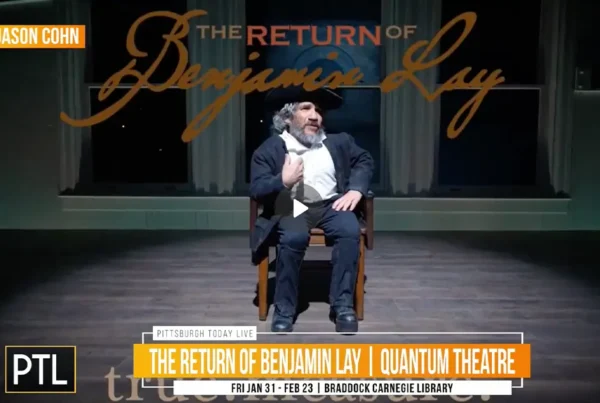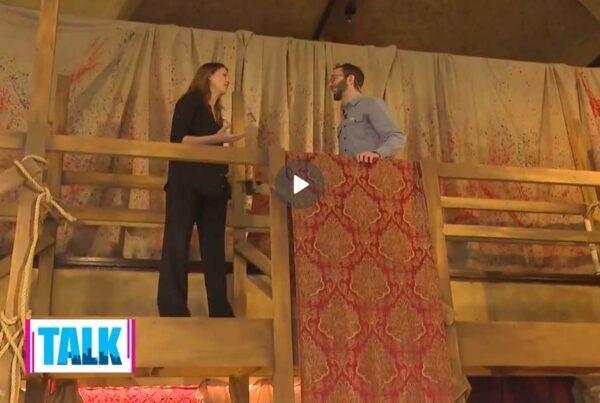Pittsburgh Post-Gazette – “Reason in madness” seems the very definition of what Quantum Theatre does, so thanks, Shakespeare, for the quote. It happens to come from “King Lear,” which also is on point — Quantum’s latest adventure into the wilds of Pittsburgh is plucking down the epic tragedy amid the rusty ruins of the Carrie Blast Furnaces National Historic Landmark.
It’s also quite reasonable that this “Lear” had its start at Bricolage Productions, which shares a reputation for risk-taking theater in unexpected spaces.
The newly pared-down adaptation began as a reading at Bricolage — a favor to James Kincaid, a University of Pittsburgh literature professor, and 93-year-old author Julian Markels, who co-adapted the script.
Bricolage’s leaders, Jeffrey Carpenter and Tami Dixon, arranged the reading “just so they could hear it out loud,” with Carpenter as Lear and Dixon as steadfast daughter Cordelia, with Risher Reddick directing.
Quantum’s Karla Boos attended the reading and invited Carpenter to reprise his role in a full production. “She was like, ‘You’ve got to do this.’ And we were like, ‘We’re not going to do it, but you should do it.’ So here we are,” said Carpenter.
Dixon now plays the Fool (“I think she relishes the idea of driving me nuts,” Carpenter said of his wife), and Reddick continues at the helm.
Carpenter, 52, who has grown an impressive beard to give him a more Lear-like presence, readily admits, “I never would have cast myself in this role.”
For one thing, he’s decades younger than we envision Lear — Glenda Jackson, now appearing on Broadway as the narcissistic king who descends into madness, is 82.
“But it was impossible to say no,” Carpenter said. “What an amazing opportunity! And it’s been one of the most amazing experiences of my life so far.”
It’s helpful that Carpenter is comfortable in a space that might seem unforgiving — make that impossible — to other creative minds.
For one thing, he attended the now defunct Swissvale High School, looking down at the site. He recalled that, even as the steel industry waned, skeleton crews would keep the furnaces going because it took so long to get the furnaces started up once they were put out.
Now the historic landmark offers tours, which can be packaged with a ticket to “King Lear.” Audiences who choose not to go on a tour still get a bit of a walkabout. Act 1 is staged in the shadow of the Carrie Deer sculpture that was created by the Industrial Arts Co-op in the late 1990s.
Among those joining the guerrilla artists of the Industrial Arts Co-op in putting the sculpture together was Jeffrey Carpenter.
He was invited by Liz Hammond to join Tim Kaulen and others, “seven guys, doing art for art’s sake, in a place where you have to break in to even see it. They do it over a year, hunting down all the materials. I was only there for a week. I helped with the left ear,” Carpenter recalled.
Now he’s back in that space and helping to build a theatrical experience in a former seat of industry.
There is also the weather to contend with, although the elements play a big role in “Lear.”
On one of Pittsburgh’s recent torrential rain days, cast members were huddled inside a Swissvale warehouse as Pittsburgh fight coordinator extraordinaire Randy Kovitz and Reddick staged a key violent scene with cast members Dana Hardy Bingham, Ken Bolden, Katherine Gowl, Connor McCanlus and Michelangelo Turner in a tight space, cordoned off to the specs of where the scene will take place on site.
“Trying to create intimacy in that space is a magic trick,” Carpenter said. “You can easily get absolutely dwarfed.”
After intermission, the audience and cast will move to the Iron Garden, where Quantum’s website notes, “Native plants and concrete relics evoke ancient Britain. In the twilight of a stone-ringed clearing, the audience intimately experiences the king’s exile and madness.”
King Lear, it turns out, is a loser in the game of thrones. When he declares he will divide his kingdom among his three daughters, he adds the caveat that he will give the largest portion to the one who loves him most.
He does not choose wisely or well.
“The line that speaks to me the most is, the moment where he reveals, ‘They told me I was everything. ’Twas a lie,’” said Carpenter. “Getting to that point of realizing you have lived your life without realizing what it was, and coming to that realization when it’s too late … it’s interesting at my age and where I am in my life.”
It’s a place he never expected to be, acting larger than life on a historic stage that’s fit for a Shakespearean king.




